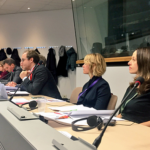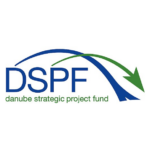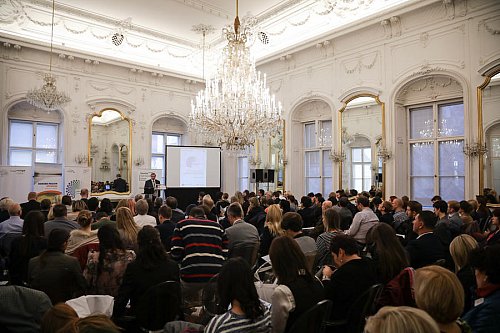DANUBE PARTICIPATION DAY 2017: MAKING PARTICIPATION CONCRETE
The 4th Danube Participation Day took place at the Andrássy University Budapest on the 17 October 2017, prior to the EUSDR Annual Forum 2017. The motto of this year’s conference was “Science meets Participation, Innovation and Sustainability – The Agenda for Participation in EU Macro-Regional Strategies” and marked the start of the “Agenda for Participation” that was developed this year by Priority Area 10 “Institutional Capacity and Cooperation”, the Danube Civil Society Forum, Interact and further partners.
Over 200 representatives from civil society, local, regional and national public authorities, politics, research and interest organisations gathered at the 4th edition of the Danube Participation Day in order to exchange on good practices for participatory governance and discuss concrete steps towards better involvement of civil society and local actors in decision-making and policy implementation.
In their opening speeches, Dietmar Meyer (Rector of the Andrássy Univeristy), Felix Moldovan (Ministry of Foreign Affairs and Trade of Hungary, representative of the Hungarian Presidency of the EUSDR) andRudolf Schicker (Coordinator of Priority Area 10) highlighted the necessity for cooperation for prosperity in the Danube Region.
Andre Baumann (State Secretary in the Ministry of the Environment, Climate Protection and the Energy Sector) reflected on his experiences related to the collaboration with non-governmental organisations. Although the process is not always easy and might create frustration along the path, it always turned out to be worth all the effort. Thus, Andre Baumann calls on all participants to carry on or initiate the cooperation between public authroities and civil society. Zoltán Pállinger (Andrássy University Budapest) presented an academic view on participation by lining out different trajectories.
THE AGENDA FOR PARTICIPATION IN THE EU MACRO-REGIONAL STRATEGIES
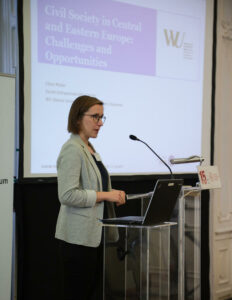 Clara Moder (Social Entrepreneurship Centers, Vienna University of Economics and Business) presented findings from the recently published study on “The State of Civil Society in Central and Eastern Europe”. Civil society fulfill a crucial role in advocating different interests in society and as a watchdog in order to support democratic values. Phenomena such as social media and digitalisation provide new opportunities for the organisation of civil society engagement. Especially the Czech Republic, Slovakia and Hungary show a high potential of citizen engagement and mibilisation. However, limited funding, lack of capacities to apply for large scale EU funding and a hostile atmosphere against critical civil society organisations are major challenges in Central and Eastern Europe. (The study can be downloaded in the Document section – “Studies, Report & Tools” – of the website.)
Clara Moder (Social Entrepreneurship Centers, Vienna University of Economics and Business) presented findings from the recently published study on “The State of Civil Society in Central and Eastern Europe”. Civil society fulfill a crucial role in advocating different interests in society and as a watchdog in order to support democratic values. Phenomena such as social media and digitalisation provide new opportunities for the organisation of civil society engagement. Especially the Czech Republic, Slovakia and Hungary show a high potential of citizen engagement and mibilisation. However, limited funding, lack of capacities to apply for large scale EU funding and a hostile atmosphere against critical civil society organisations are major challenges in Central and Eastern Europe. (The study can be downloaded in the Document section – “Studies, Report & Tools” – of the website.)
After this assessment of the state of play, Stefan August Lütgenau (Danube Civil Society Forum, Foster Europe) introduced the Agenda for Participation in the EU macro-regional strategies. The agenda is accompanied by the following five Participation Partnerships that were initiated in the Working Groups that took place in the afternoon:
- Participation Partnership – A research perspective: Blaz Barboric, Geodetic Institute of Slovenia (Lead Partner)
Inputs by :
Jaroslava Szüdi (EUSDR Priority Area Coordination 7)
Robert Müller-Török (Hochschule für öffentliche Verwaltung und Finanzen Ludwigsburg)
Robert Braun (Institute for Advanced Studies Vienna) - Participation Partnership – Building Macro-regional Strategies on local and multi-level governance: Stefan August Lütgenau, Danube Civil Society Forum/Foster Europe (Lead Partner)
Inputs by:
Daniela Urschitz (EUSDR Priority Area Coordination 10)
Niall Sheerin (Council of Europe)
Iva Taralezhkova (Citizen Participation Forum)
Zinoviy Broyde (Centre “EcoResource” Ukraine) - Participation Partnership – A key factor of social innovation and sustainable development: Stefan Barth, Agapedia Foundation (Lead Partner)
Inputs by:
Volker Then (Centrums für Soziale Investitionen und Innovationen (CSI), University of Heidelberg)
Dilyana Gyurova (CONCORDIA Bulgaria Foundation) - Participation Partnership – Designing 2020+ with Local Actors in the Macro-regional Strategies: Claudia Singer, Priority Area 10 Institutional Capacity & Cooperation of the EU Strategy for the Danube Region (Lead Partner)
Inputs by:
George Petrov (Citizen Participation Forum)
Thomas Heindl (LEADER Südliches Waldviertel – Nibelungengau)
Vladimir Kvaca (ESF Transnationality Public Administration and Governance Network) - Participation Partnership – Empowering Roma: Roland Hanak & Barbara Willsberger, Priority Area 9 People & Skills of the EU Strategy for the Danube Region (Lead Partner)
Inputs by:
Sheena Keller (Fundamental Rights Agency)
Gordon Smith (EuroCities, Roma Inclusion Working Group, Glasgow)
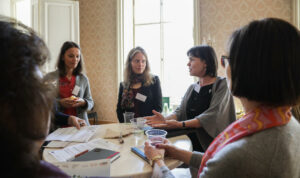 The Working Groups provided a selection of good practice inputs that were discussed with the participants and complemented with their experience. The participants discussed challenges and opportunities in the respective thematic fields and talked about possible steps to address the these challenges. The results of this discussion feed in an action plan for the Participation Partnerships.
The Working Groups provided a selection of good practice inputs that were discussed with the participants and complemented with their experience. The participants discussed challenges and opportunities in the respective thematic fields and talked about possible steps to address the these challenges. The results of this discussion feed in an action plan for the Participation Partnerships.
In the afternoon, the Danube Participation Day offered the opportunity to inform about national activities. Daniela Stojkovic (NGO World and the Danube) presented information on the National Participation Days. Miklos Barabas (European House) and Csaba Madarász (e-Democracy Workshop Association) talked about Hungarian initiatives of the civil society.
The Danube Participation Day was moderated by Jörg Mirtl (Interact).
PASSING THE BELL FROM HUNGARY TO BULGARIA
In the Closing Session, Dietmar Meyer passed the bell – the symbol of the Danube Participation Day – toIva Taralezhkova (Citizen Participation Forum), who will be hosting the 5th Danube Participation Day in Sofia in 2018. Iva Taralezhkova highlighted the necessity of participation in the Danube Region and looks forward to the next Danube Participation Day that will keep up the participatory spirit in the planning process.
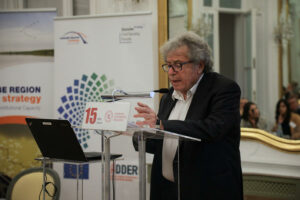 The 4th Danube Participation Day concluded with speeches from the renowned Hungarian author György Konrád and the State Counsellor for Civil Society and Civic Participation in Baden-Wurttemberg, Gisela Erler.
The 4th Danube Participation Day concluded with speeches from the renowned Hungarian author György Konrád and the State Counsellor for Civil Society and Civic Participation in Baden-Wurttemberg, Gisela Erler.
In his speech, György Konrád made a strong plea for a cooperative Europe that furthers peace, democratic values and prosperity and builds upon its rich culture. State Counsellor Erler reinforced the meaning of a cooperative culture to strengthen Europe.
The 4th Danube Participation Day was organised by the DCSF, Priority Area 10 “Institutional Capacity and Cooperation” and the Andrássy University and supported by the Baden-Württemberg Foundation, LADDER, Foster Europe, the Danube Transnational Programme, Alda, Agapedia, ELDW, and the City of Vienna.
All presentations and photos are available here.
Photo Credit: Peter Majercik


